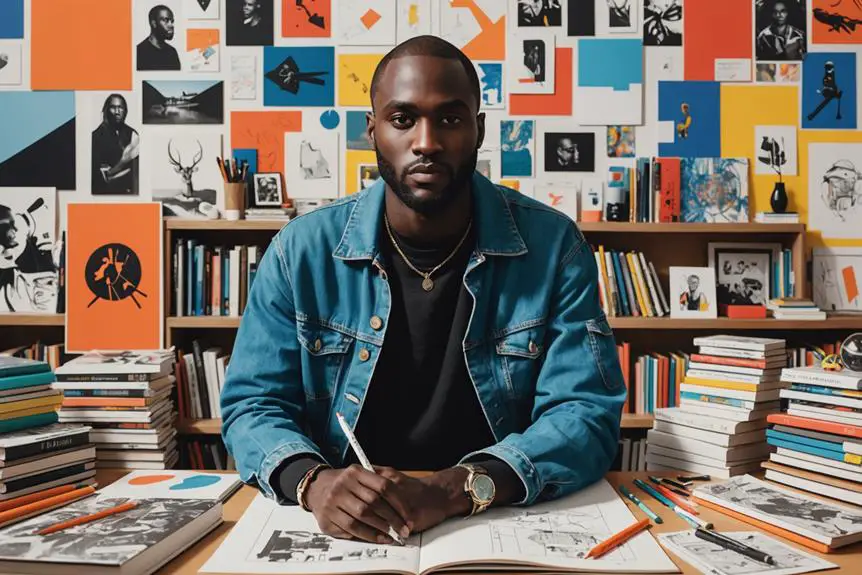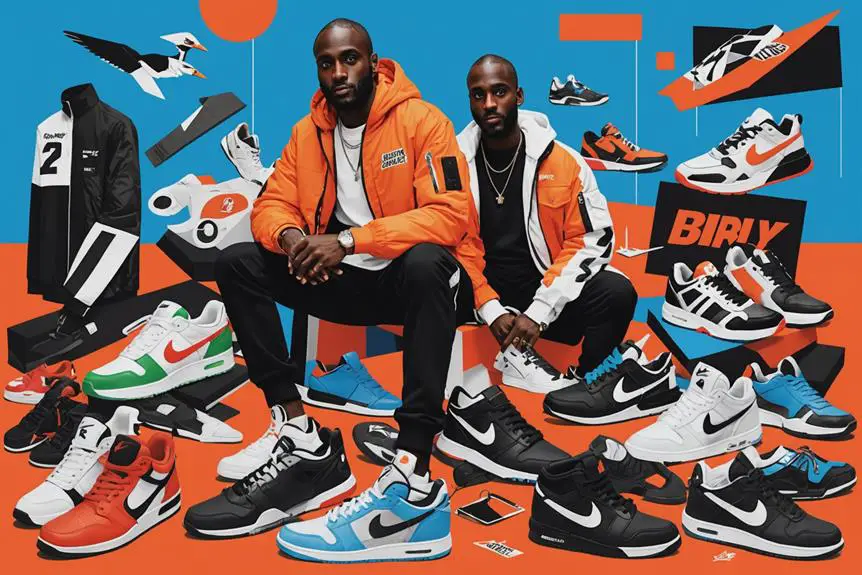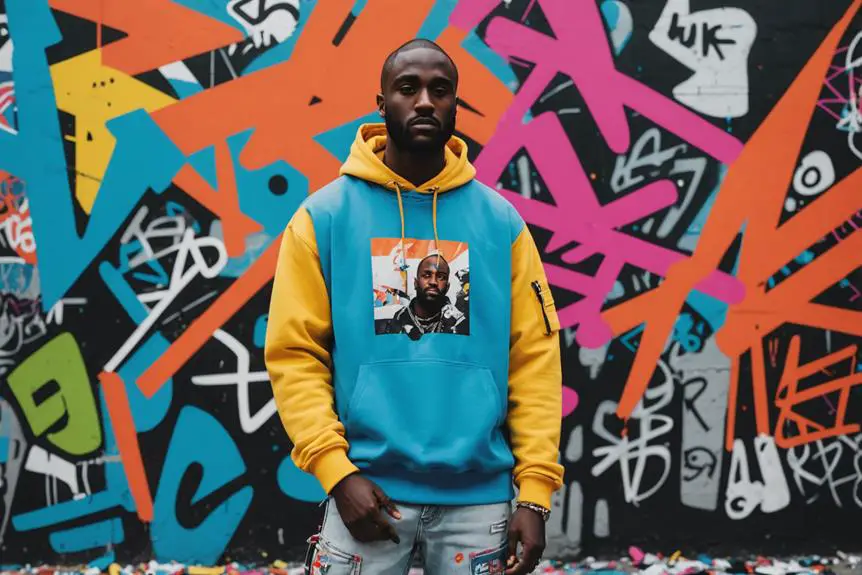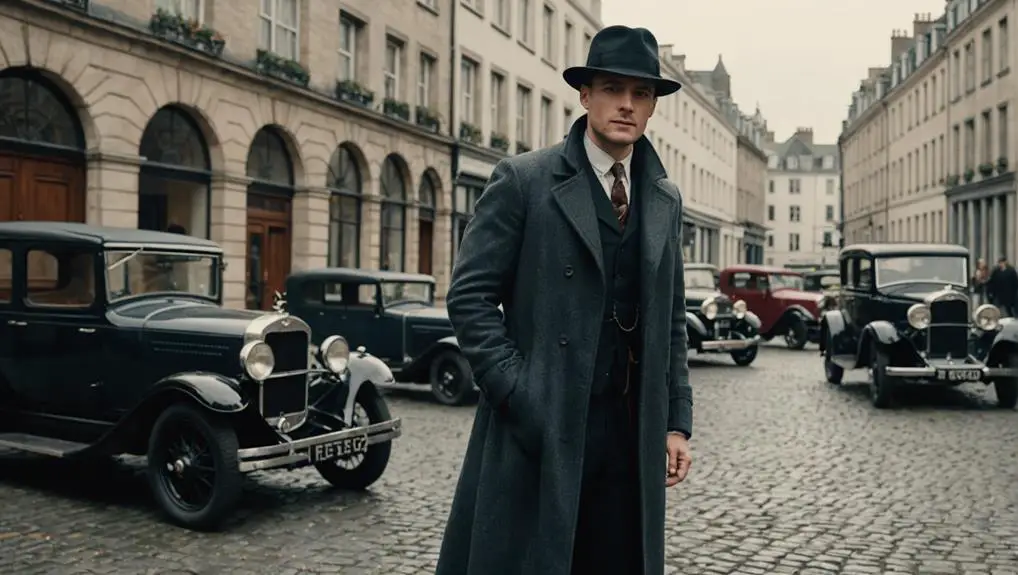When considering the evolution of fashion, the impact of Virgil Abloh is undeniably significant. Beginning his career at the intersection of civil engineering and art, he ultimately became the first African American artistic director at Louis Vuitton, which marks a pivotal moment in the industry. Abloh's talent for blending streetwear aesthetics with high-end luxury not only redefined existing norms but also sparked debates on authenticity and cultural appropriation. As you delve into his remarkable journey, it's intriguing to reflect on how his design philosophy—deeply rooted in storytelling—has influenced the landscape of fashion and what it signifies for aspiring designers. What elements of his life and work resonate most with you?
Early Life and Education

Virgil Abloh's journey began in Rockford, Illinois, where his upbringing laid a strong foundation for his future as a designer. Growing up with Ghanaian immigrant parents, he was surrounded by creativity; his mother was a seamstress, and his father managed a paint company, which served as a significant source of inspiration. These early influences undoubtedly shaped his artistic vision. After graduating from Boylan Catholic High School in 1998, Abloh took a unique path, first earning a degree in Civil Engineering from the University of Wisconsin-Madison in 2002.
But his educational pursuits didn't stop there. Abloh went on to obtain a master's degree in Architecture from the Illinois Institute of Technology, where he studied under a curriculum influenced by the esteemed Mies van der Rohe. This combination of engineering and design allowed him to develop an interdisciplinary approach that merged art, craft, and design. His exposure to Bauhaus principles further enriched his perspective, enabling him to explore new ideas in innovative ways.
It's remarkable how diverse experiences can foster groundbreaking creativity. Abloh's educational journey illustrates the importance of embracing various interests to discover one's true passion. As you carve out your own path, remember that you never know where your unique experiences might lead you!
Career Milestones
Virgil Abloh's career milestones illustrate his extraordinary rise in the fashion industry, characterized by groundbreaking achievements and influential collaborations. Most people recognize him for founding Off-White in 2013. This luxury streetwear brand quickly gained attention for its innovative fusion of high fashion and urban aesthetics, redefining the contemporary fashion landscape.
In March 2018, Virgil made history as the artistic director of Louis Vuitton's menswear, becoming the first African American to lead a French luxury fashion house—a monumental achievement! Prior to this, he interned at Fendi in Rome in 2009 alongside Kanye West, an experience that marked the beginning of his influential journey in fashion.
Virgil's creative talents extend beyond the realm of fashion; in 2011, he received a Grammy nomination for his artistic direction on Kanye's album "Watch the Throne." This highlights his multifaceted abilities across various creative fields.
In July 2021, LVMH acquired a 60% stake in Off-White, further enhancing Virgil's creative influence and solidifying his impact on the fashion landscape. Additionally, he holds a master's degree in Architecture, showcasing the depth of his intellectual prowess alongside his artistic vision. With these remarkable milestones, it's evident that Virgil Abloh is not just making waves—he's crafting an entirely new ocean in the world of fashion! His journey is nothing short of inspiring.
Collaborations and Projects

Abloh's innovative spirit shines through in his extensive collaborations and projects that span various industries. His unique vision has undeniably transformed contemporary fashion, making it more accessible and culturally resonant. From sneakers to furniture, his work masterfully blends luxury and streetwear in a way that feels incredibly authentic.
Here are some of his standout collaborations:
- Nike's "The Ten": Abloh reimagined ten iconic sneaker models, revolutionizing sneaker culture and the resale market.
- MARKERAD with IKEA: This collection catered perfectly to first-time homeowners, featuring stylish yet functional furniture pieces that marry design with practicality.
- Partnership with Takashi Murakami: Together, they produced limited-edition artworks and fashion items, merging their unique styles into something truly special.
- Mercedes-Maybach collaboration: This project showcased luxury vehicles infused with Abloh's signature streetwear aesthetic, pushing the boundaries of automotive design.
These projects illustrate that Abloh is not just a designer; he is a cultural icon. His collaboration with Kanye West on the album "Watch the Throne" even earned him a Grammy nomination, highlighting his ability to transcend the realms of fashion and music. It's inspiring to see how Virgil's collaborations not only elevate brands but also encourage an entire generation to rethink the concepts of luxury and contemporary fashion. So, what's your favorite Abloh project?
Design Philosophy
At the core of Abloh's design philosophy is a human-centered approach that prioritizes user experience and accessibility. He emphasizes making design relatable and engaging for everyone. With a degree in Civil Engineering, Abloh skillfully blended practical thinking with a curriculum established by Mies, which focused on form and function. His work challenges traditional notions of fashion hierarchy, proving that luxury can indeed be fun. By incorporating irony and humor into his designs, he captures attention and sparks joy.
Abloh's design philosophy extends beyond clothing; it embodies an inter-disciplinary practice that merges art and design, drawing inspiration from contemporary culture. He transforms everyday objects into luxury items that tell compelling stories. His focus is on storytelling through clothing and accessories, creating narratives that resonate emotionally with consumers.
Wearing something designed by Abloh means becoming part of a larger conversation. His pieces invite reflection, laughter, and even a challenge to conventional views on fashion. In a world where design can sometimes feel distant, Abloh's approach brings it back to the people, making it relatable and exciting. So, the next time you slip into one of his creations, remember: it's more than just fabric; it's a story waiting to be told!
Controversies and Criticism

When you hear Virgil Abloh's name, you might think of his innovative style, but he's also been at the center of significant controversy. From allegations of plagiarism regarding his designs to disputes over the originality of his logos, there has been plenty of debate surrounding his work. So, what do you think? Is it all in good fun, or is there a fine line between inspiration and imitation?
Plagiarism Allegations
The work of Virgil Abloh is often accompanied by controversy, particularly due to allegations of plagiarism that have ignited passionate discussions within the fashion industry. This raises an intriguing question: where does one draw the line between inspiration and explicit copying? Detractors suggest that some of Abloh's creations tread this fine line, prompting a closer examination of originality and the ethics of design.
Consider these notable points:
- Observers have highlighted parallels between Abloh's designs and those of various other artists.
- The fashion blog Diet Prada has brought attention to multiple instances that have intensified these plagiarism claims.
- His 2019 Fall/Winter collection faced criticism for its inspiration from Michael Jackson during a particularly sensitive period.
- Graphic designer Ben Kelly has even asserted that the Off-White logo bears a striking resemblance to his own work.
Abloh's frequent use of quotation marks invites dialogue about the contemporary visual language in fashion. Some interpret this as a homage to Bauhaus principles, while others critique it as an easy way out. As a creative director, Abloh's methodology certainly leaves room for speculation. What are your thoughts on these controversies? Do they enhance his mystique or diminish his legacy?
Logo Originality Disputes
Virgil Abloh's approach to logo design has ignited a series of controversies, particularly surrounding the originality of the Off-White logo. Accusations of plagiarism emerged, notably from graphic designer Ben Kelly, who asserted that Abloh's logo bore a striking resemblance to his own work. Quite a dilemma, isn't it?
Fashion blog Diet Prada did not shy away from voicing their concerns either, highlighting that numerous designs by Abloh appeared to echo those of established designers. This raised profound questions about originality and creative integrity within the fashion industry. The frequent use of quotation marks in his designs led critics to argue that it reflected a deficiency of originality rather than a profound artistic statement.
Additionally, the 2019 collection that drew inspiration from Michael Jackson faced scrutiny due to its timing, coinciding closely with the release of the documentary "Leaving Neverland," further fueling the debate. Nevertheless, Abloh continues to be a significant figure in the fashion realm, adept at transforming criticism into dialogues about creativity and cultural appropriation. So, what's your perspective—can controversy indeed drive creativity?
Legacy and Influence
The impact of Virgil Abloh on the fashion industry is nothing short of revolutionary. His legacy transcends mere clothing; he transformed our understanding of luxury fashion and creativity. By merging streetwear with high-end design, he paved the way for a new generation of designers. His influence is palpable, resonating from high-profile runway shows to casual street style.
Here are some notable highlights of his contributions:
- He made history as the first African American artistic director at Louis Vuitton, breaking significant racial barriers in the fashion world.
- Abloh established the Virgil Abloh Post-Modern Scholarship Fund to support Black designers, successfully raising $1 million for educational initiatives.
- His work ignited essential conversations surrounding race and identity, intertwining fashion with profound cultural dialogues.
- Exhibitions, such as the one at the Museum of Contemporary Art, honor his diverse practice that spans art, music, and architecture.
In many ways, Abloh's journey can be likened to an architectural curriculum. He constructed a foundation that emphasizes not only fashion but also storytelling and creativity. His approach serves as a source of inspiration, reinforcing the idea that style is not solely about clothing; it's an expression of identity. Therefore, whether you're an aspiring designer or a fashion enthusiast, Abloh's influence serves as a reminder that creativity knows no limits. His contributions will undoubtedly continue to inspire and provoke thought within the industry for years to come. How remarkable is that?
Frequently Asked Questions
What Type of Designer Is Virgil Abloh?
Virgil Abloh was a designer who seamlessly blended streetwear influence with fashion innovation. His artistic vision and design philosophy emphasized cultural commentary, luxury collaborations, and brand identity through creative partnerships that redefined contemporary fashion. Abloh's work continues to inspire and influence the fashion landscape, making him a significant figure in the industry.
What Is the 3 Percent Rule Virgil?
The 3 percent rule, as seen in the work of renowned fashion designer Virgil Abloh, emphasizes that small changes in design can ignite significant creative innovation. This principle is evident in Abloh's collaborations, which have redefined brand partnerships and brought fashion accessibility to the forefront. His influence on streetwear evolution showcases the cultural impact of his designs and the seamless integration of luxury within contemporary design philosophy.
Who Was Virgil Abloh to the Kardashians?
Virgil Abloh was a pivotal figure in the fashion world, particularly known for his innovative design philosophy and celebrity collaborations. His influence extended beyond traditional fashion boundaries, shaping the style evolution of many celebrities, including the Kardashians. Through his distinctive approach, he created cultural intersections that not only impacted the fashion industry but also fostered personal friendships within the celebrity community.
Who Is the Creative Designer of Off-White?
The creative designer of Off-White, Virgil Abloh, has made a significant impact on the fashion industry, blending streetwear influences with high fashion. His innovative techniques and distinctive design philosophy have redefined contemporary style. Off-White's cultural significance, bold brand aesthetics, and memorable collaborations with various artists and brands have solidified its legacy in the fashion world.





Thanks for sharing. I read many of your blog posts, cool, your blog is very good.
Thanks for sharing. I read many of your blog posts, cool, your blog is very good.